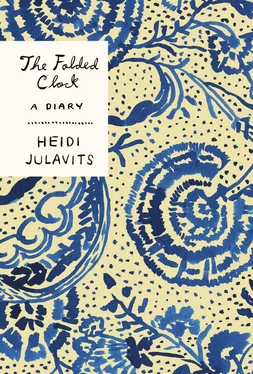I said nothing. I chose not to seize the restructuring opportunity offered by the guru. Instead I listened; I nodded. The sun was hot on my back. I was struck by a guru-worthy koan to describe my current situation: To face away from the sun is not to hide from it . My friends and I have our friendship origin tales, just like the guru has hers. These are our paths to enlightenment, or maybe just our paths to this cabin, to this beach, to this day, to our girlhoods, to which we are fast losing the connection. I believe it is not wrong to protect these stories, even if such protection requires a little dishonesty in the form of silence. I did worry, however, that the crevasse over which we faced one another would eventually grow too wide. As yet, it had not. I was thankful for this. It was nearing noon now. My shoulders were starting to burn.
Today I read a book while holding a fountain pen. I often have a pen in my hand when I read. I am trying to fool myself into thinking I am writing when I’m not. I read with a pen in my hand because it helps me think. If I underline a sentence, I temporarily own it. It’s mine. I have bought real estate in this book, laid down stakes, moved in. This does not mean I remember where I live. I turn the page. I lose my place.
I used to be more of a habitual loser than I am now. In the past, I lost everything. Official, identity-reinforcing objects such as my wallet, these I lost regularly. Often my wallet was found before I knew it was lost. One night I received an e-mail from a woman who’d tracked me down online. She said, “I found your wallet on the street.” I thought: what is she talking about? I have my wallet right here. But I didn’t.
I have also lost my passport. Once when I was twenty-four, and in Morocco, and traveling with my boyfriend and a woman whose terrible Arabic she made up for with outraged panache (she would ask a carpet merchant, when he told her the price of a carpet she wanted, “Am I a donkey?” and he would immediately halve the price), I discovered my passport missing during a sandstorm. We were in a Berber town on the edge of the Sahara Desert. We ransacked our hotel room as the sand hit the windows and sounded, apocalyptically, like rain. My passport was gone. This meant we could not go into the Sahara, as planned, in an old Mercedes driven by an old man we’d hired for the excursion, even though it was August, and eight trillion degrees, and when we told people our plans, they laughed at us, not because we were funny, but because we were stupid and going to die. This was their opinion and they were probably correct. The old Mercedes, the old man, our mettle — something or someone would have failed.
But now we could not go into the Sahara because I had a flight home in five days that required a passport. I was starting a new job. It seemed a very bad idea to be a week or two late for my first day of work, so the missing passport needed to be dealt with. Unfortunately, the nearest passport office was a thousand miles away. We repurposed our driver. We told him we didn’t want to go to the desert — we wanted to head north through the Atlas Mountains to the nearest airport in Casablanca, so that I could fly to Rabat, so that I could get a passport, so that I could then take another taxi across the country to a Spanish principality, and get on a plane home that was so indirect I would have to first switch airports in London and spend the night on the terminal floor.
So the driver took us north. In the High Atlas, we stopped to look at carpets, and we sat around drinking mint tea, and the woman asked, “Am I a donkey?” and we left with four carpets. We descended the mountains and it got dark. We drove up another set of mountains and at around two a.m. the driver begged to rest, so we pulled to the side and spread out our new carpets and slept for an hour. Dawn happened. We returned to the cab and drove down the last mountain into Casablanca, and we boarded a very large white 747 headed for Paris and then America but stopping first in Rabat, and when we disembarked in Rabat, a city which to my memory looked and smelled like a wetly rotting dock pylon, we checked into a hotel room, and as the woman was looking for a sweater, because for the first time in weeks she was cold, she found my passport.
We were dumbfounded. Who had put my passport in her suitcase? The taxi driver? The carpet merchant? Sometimes when you’re in a foreign country, it feels like everyone is in on a joke against you. My boyfriend accused the woman — they’d been fighting — of hiding it on purpose. But to what end? She appeared guilty, true, but only because she was guilty, albeit innocently, of harboring my passport. Who knew what had happened, but now we were stuck in this damp city, and we tried to believe that fate had intervened to make us change our plans. We might have perished in that hot desert. The sandstorm was a sign.
Loss, what I am trying to say, so long as you’re dealing with objects, can be spun as opportunity. Because I lost my passport we did not die in the Sahara. Because I lost a cashmere cardigan at a bus stop in Hyde Park, and decided that the University of Chicago student who probably found it would, instead of keeping it, decide to sell it on eBay to make some pocket money, I discovered eBay, and truly feel that eBay has measurably improved my mental quality of life more than doctors or drugs. Because I lost a necklace in a river I learned that the state of Vermont has a scuba diving club. All of this does and does not explain why my mother-in-law, at my marriage to her son, read “One Art” by Elizabeth Bishop, the opening lines of which are
The art of losing isn’t hard to master;
so many things seem filled with the intent
to be lost that their loss is no disaster .
Nor does it explain how I lost my way today. I started writing because I was holding a fountain pen in my hand and a drip of blue ink landed on my sweater. Without thinking I stuck the sweater in my mouth. I sucked the ink like it was blood.
Today I am working in the library of the German villa. I have my favorite spot. Next to me are books about Germany with titles like Deutschland, Wo Ist Du? and The German Question and Other German Questions . Usually there is an actual German in this library. The German is an architect. The German architect and I bonded a few weeks ago over a building we both liked and which I’d found in the nearby woods while on a bike ride. He said about the building, in his very kind way, “I am so happy you discovered it,” which I interpreted as, “What a remarkable person you are for having the same good taste as me. I am so pleased we found each other.”
Soon afterward, the architect and I both began working in the library. All day long we spend together. His living space in the villa, I gather (from reports) is very nice and overlooks the lake. We’d commiserated over the fact that working alone, even in one’s lakefront suite, is not as appealing as grinding it out in the presence of others. We both needed someone with whom to share a glance when a man spent hours tuning the piano just outside the library doors, and then complained to a passing American, “This building is full of plaster, and plaster is the enemy of sound.” We both needed to be guilted into working longer hours, or maybe we saw it as a competition. Who would be the first to leave the library when the Berlin sun set at three-thirty p.m.? Who would be the first to crack a Berlin beer? Who would be the first to cave to the library’s chilly temperatures and start writing in gloves and a coat?
Soon this competition we were or were not in became a crush. My husband jokingly accused me. I denied nothing. It was no big deal; it was just another of my workplace infatuations. Also this architect is the age of my dad.
Читать дальше












